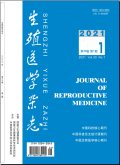生殖医学杂志2024,Vol.33Issue(7):893-899,7.DOI:10.3969/j.issn.1004-3845.2024.07.008
封闭抗体阴性的反复种植失败患者淋巴细胞主动免疫治疗助孕结局的影响因素分析
Analysis of factors influencing the outcome of lymphocyte active immunotherapy in patients with negative blocking antibody and repeated implantation failure
摘要
Abstract
Objective:To explore the effects of lymphocyte active immunotherapy(LIT)on pregnancy outcomes of patients with negative blocking antibody(BA)after repeated implantation failure. Methods:Eighty-four BA negative and repeated implant failure patients who volunteered for assisted reproduction in Second Affiliated Hospital of Hainan Medical College from January 2021 to February 2023 were selected as the study group.All patients received LIT treatment and were divided into successful assisted pregnancy group(n=58)and failed assisted pregnancy group(n=26)according to assisted pregnancy outcomes after treatment.General clinical data[age,age of spouse,body mass index(BMI),number of abortions,duration of infertility,number of antral follicles]and characteristics related to LIT treatment(LIT preparation concentration,number of treatments,BA positive rate)as well as pre-treatment sex hormone and anti-Müllerian hormone(AMH)levels,immune cell levels(percentages of CD4+T cell and CD8+T cell,CD4+/CD8+ratio)and inflammatory factor levels[interferon gamma(IFN-γ),interleukin(IL)-4,IL-10,IL-17,transforming growth factor(TGF)-β]were compared between the two groups.Spearman correlation analysis and multivariate logistic regression analysis were used to screen the factors influencing the success of assisted pregnancy in BA negative patients with repeated implant failure treated with LIT. Results:There were no statistical differences in general clinical data and basal hormone levels between the two groups(P>0.05).The average concentration of LIT and the positive rate of BA in successful pregnancy group were significantly higher than those in failed pregnancy group(P<0.05).The percentage of CD4+T cells and CD4+/CD8+ratio in patients with successful pregnancy were significantly higher than those in patients with failed pregnancy before treatment(P<0.05).The serum IL-4,IL-10 and TGF-βlevels of patients with successful pregnancy were significantly higher than those of patients with failed pregnancy(P<0.05),while the serum IL-17 level was significantly lower(P<0.05).Spearman correlation analysis and multivariate Logistic regression analysis results showed that BA positive transforming,higher concentration of LIT preparation,higher percentage of CD4+T cells,higher ratio of CD4+/CD8+,higher levels of IL-4,IL-10,TGF-β and lower level of IL-17 were important factors influencing successful pregnancy in BA negative patients receiving LIT treatment(P<0.05). Conclusions:LIT can effectively convert BA into positive among BA negative patients with repeated implantation failure,and patients with higher concentration of LIT preparation,lower levels of proinflammatory cytokines,higher levels of anti-inflammatory cytokines and immune cells,and higher BA conversion rate are more likely to succeed in assisted reproduction strategy.关键词
淋巴细胞主动免疫治疗/封闭抗体阴性/反复种植失败/辅助生殖Key words
Leukocyte immunization therapy/Blocking antibody negative/Repeated implantation failure/Assisted reproduction分类
医药卫生引用本文复制引用
胡英,黄勇..封闭抗体阴性的反复种植失败患者淋巴细胞主动免疫治疗助孕结局的影响因素分析[J].生殖医学杂志,2024,33(7):893-899,7.基金项目
海南省卫生健康行业科研项目(20A200432) (20A200432)

